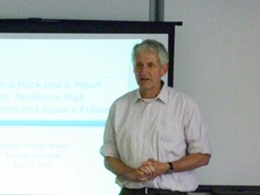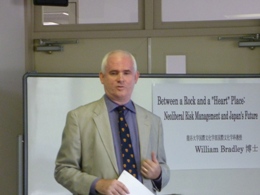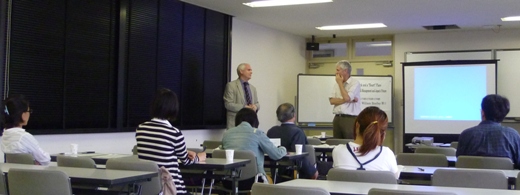|
|
5月31日(木)、リスク研究センターでは、William Bradley博士(龍谷大学国際文化学部国際文化学科教授)をお招きして、セミナーを開催いたしました。
|

|

|

|
Professor Bradley started this very interesting talk by introducing Dominique Moisi's theory of the 'Geopolitics of Emotion' which identifies different regions of the world with different dominant emotions. He says that Japan is caught between the 'hope' of Asian countries like China and India and the 'fear' that characterizes the developed regions of Europe and North America. The fear that results from economic decline and nuclear crisis is balanced by another set of narratives focusing on the hope for political renewal and cultural regeneration of Japan, visualized through the massive volunteer campaigns undertaken by many (but not only) young people (e.g. 'Project Hope').
Economists, political scientists and other social scientists are wary of discussing emotions as part of their analysis. Instead they prefer to think of people as rational actors. A highly rational approach to the role of markets in many aspects of a nation's life is at the heart of neoliberalism. In the 1980s, proponents of neoliberalism, Reagan in the USA, and Thatcher in the UK believed in the notion that the state should be an agent that intervenes just enough to correct agents, institutions and mechanisms that hamper competition. Neoliberalism is connected to 'Risk' in the way that both encourage individuals to take responsibility for their own welfare and prosperity. However, the ongoing global financial crisis has presented neoliberal capitalism with a potentially terminal crisis. Since nobody can know what will come next, there is the possibility in Japan for a coming together of hope and aspiration with neoliberal ideas of personal responsibility. The success of Hashimoto in Osaka may be partly explained by his ability to articulate a narrative that brings these together.
(文責:Robert Aspinall)
このホームページに関するご意見・ご質問は
滋賀大学リスク研究センター TEL:0749-27-1404 FAX:0749-27-1189
E-mail: までお願いします。
